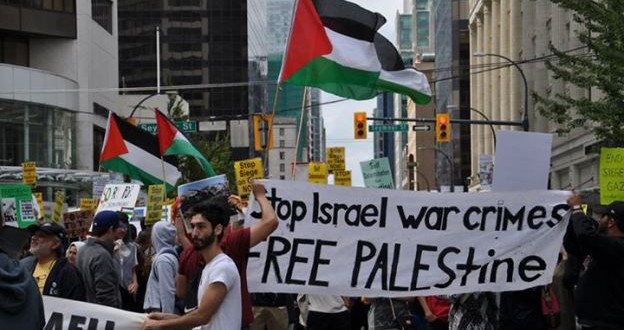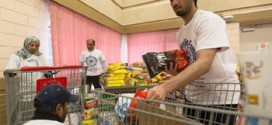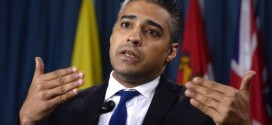This article is the second in a 3-part series that investigates Israel’s massacres in Gaza from a UBC perspective. It examines the challenges to Palestinian solidarity activism on campus. This first part provided a general overview of Canada’s relationship with Israel. The last piece will focus on Hillel UBC.
In yet another harrowing series of military airstrikes and a ground invasion led by Israel in the Gaza strip this summer — named Operation Protective Edge — some 1473 Palestinian civilians were killed, including 501 children, and over 110,000 have been internally displaced. In the wake of this unremitting violence in the Occupied Territories, there is the usual and deliberate rhetoric that emerges from the vestiges of self-exalting Western political faculties. Both Obama and Harper have staunchly supported these military operations as Israel’s “right to defend itself” from “terrorism associated with Hamas.” Most of the major Canadian federal parties[1][2][3] have also come out with statements along these same lines. Discussed as if the conflict involves two equal sides, there is no analysis of the grossly disproportionate Palestinian deaths. The root cause is said to be rockets fired by Hamas and not the structural dynamics of Israeli settler colonialism, occupation and apartheid. Further, parallel to discourse within some factions of pro-Israel Jews, Harper has formally made a statement equating criticisms of Israel with anti-Semitism. Appealing to many dominant myths, all of this marginalizes Palestine solidarity activists as ‘extremists.’ In such an antagonistic climate, on-campus organizers are feeling the fallout of this.
For student activists across Canadian university campuses, it is volatile terrain they must maneuver, reflective of the larger field of organizing around Palestine. The distemperment surrounding the recent passing of University of Windsor’s referendum to support the Boycott, Divestment and Sanctions movement (BDS), reveals there is much opposition and controversy surrounding pro-Palestine activism. Even so, the passing of this endorsement by the vote of a majority of students indicates a real success in the sphere of such activism in universities across Canada. In fact, at least nine student unions support BDS. It is interesting to note that most of these unions are from campuses out east.
At UBC, Students For Palestinian Human Rights (SPHR) is at the forefront of organizing around issues on Palestine. In collaboration with other local groups, this summer SPHR organized many rallies in the city in support of Gaza, and in response to Operation Protective Edge. The group has been quite active on campus in recent years, holding major events as a part of the international series of events, Israel Apartheid Week (IAW), for example. A couple of years ago, they erected an 8-foot high wall in front of what used to be the grassy hill known as the knoll. The structure represented the apartheid wall in the Occupied Territories, a heavily militarized and patrolled barrier that cuts into 85% of the West Bank and isolates some 260,000+ Palestinians.
SPHR has also been able to bring in some notable pro-Palestine public figures such as Norman Finkelstein in 2010 (an event that saw over 800 people in attendance), Gideon Levy (an Israeli journalist who writes unapologetically about the Israeli occupation of Palestine), also in 2010, and Dr. As’ad AbuKhalil in 2013 (an activist and professor from California also popularly known as The Angry Arab).
According to Dania Kallas, a second year Palestinian student at UBC and the current president of SPHR, there is the usual mix of responses to their events — from the spectrum of positive to negative and from unawareness to confusion. In the past, however, there have been more significant tensions. Omar Shabaan, former SPHR president and vocal Palestinian activist, recounts the many times a pro-Israel group on campus — then called the Israel Advocacy Club (IAC), but now known as Israel on Campus — tried to cancel many of the venue bookings SPHR used to make to hold events on campus. “[But] the university was always on our side”, Shabaan explained, and added, “We didn’t [ever] have anything to hide [about our events]. The admin would decide our events didn’t sound problematic and would allow us to have them.”
Even under former UBC Vice President Stephen Owen, who has been vocal in his support for Israel, SPHR was told that the university tries its best to prevent having to cancel an organization’s events. In a further action of support in this regard, admin had even helped the group make a booking at a time when they had a missed a deadline to do so. Some of this may have had to do with the fact that the IAC “[…] had been very rude to Stephen Owen”, said Shabaan, in wake of not cancelling the SPHR’s events.
Even so, Shabaan thinks the university was just trying to save face and not cause any problems. Aware of the university’s politics, he says they assisted SPHR not because they are progressive with regards to this conflict, but rather are aware of how the response has been to some eastern Canadian universities’ suppression of pro-Palestine activity on their campus’. Rather than good intentions, not wanting to put out any fires or warrant any negative media attention, may instead have been factors in helping out the SPHR.
The most escalated opposition SPHR faced however, occurred under the presidency of the 101st AMS president Bijan Ahmadian. In 2010, the Social Justice Centre (SJC) at UBC agreed to support SPHR by sending a donation to the Canadian Boat to Gaza, an initiative centred on sending aid to Gaza. However, Ahmadian blocked the financial transaction. Speculative fliers circulated on campus, incorrectly stating the donations were to go to the ‘terrorist organization of Hamas.’ SPHR and SJC organizers agreed to let the AMS council vote on the issue. After a long meeting that lasted several hours inside the Norm Theatre, filled with people both in support of sending the aid and those opposed to it, the AMS council voted to send the donations. Ahmadian was prevented from voting and several people abstained from voting. Yet the very next day, Ahmadian blocked the transaction yet again saying he wanted to seek legal counselling. Another council meeting was set up, this time with the lawyer Ahmadian sought present. After more debate, the council held another vote in which a unanimous decision to send the aid to the Canadian Boat to Gaza was made. Shabaan counts it as one of SPHR’s biggest victories.
Shabaan said that a real strength of SPHR members is their ability to engage students on the issue, and refer them to resources whenever necessary. They have zero tolerance for anti-Semitism and many members are involved with other social justice movements. As such, the group has extensive networks with activists in the city. “We also get some support from many Jewish people in the community”, said Kallas, the current president.
SPHR also works in solidarity with Indigenous communities both on and off campus. Recognizing the ongoing legacy of settler colonialism at UBC and on the unceded territory now known as Vancouver more generally, almost every single event SPHR has put on has had an Indigenous speaker. Many Palestinians are inspired by Indigenous resistance movements, and so too have many First Nations groups been by Palestinian activism. Hanna Kawas, a local Palestinian activist has even been awarded with a gift from an Indigenous women’s center, which is reflective of some of the ways in which these communities collaborate and inspire one another.
While the climate of Palestine solidarity activism at UBC can be expectedly contentious at times, SPHR continues to organize for the upcoming year. Kallas says they have many events planned for the coming months, such as fundraisers, movie screenings, and public lectures. Most excitingly, the goal of passing a BDS resolution in the AMS is on the agenda. Let us now see if UBC will follow suit with the nine other student unions across Canada that have passed it and truly live up to its proverbial “left-coast” reputation.
Originally published in The Talon
 العربي الديمقراطي The Latest From The Arab World
العربي الديمقراطي The Latest From The Arab World





